List of Nobel laureates affiliated with Princeton University
This list of Nobel laureates affiliated with Princeton University comprehensively shows the Princeton-affiliated individual winners of the Nobel Prize and the Nobel Memorial Prize in Economic Sciences since 1901. The Nobel Prizes are awarded annually by the Royal Swedish Academy of Sciences, the Karolinska Institute, and the Norwegian Nobel Committee to individuals who make outstanding contributions in the fields of chemistry, physics, literature, peace, and physiology or medicine.[1] They were established by the 1895 will of Alfred Nobel, which dictates that the awards should be administered by the Nobel Foundation. Another prize, the "Sveriges Riksbank Prize in Economic Sciences in Memory of Alfred Nobel" (commonly known as the Nobel Economics Prize), was established in 1968 (first awarded in 1969) by the Sveriges Riksbank, the central bank of Sweden, for contributors to the field of economics.[2]
As of October 2018, 65 Nobel laureates have been affiliated with Princeton University, and 44 of them are officially listed as "Princeton's Nobel Laureates" by Princeton University for being alumni or having "performed their award-winning work at Princeton, were employed by Princeton when they received their award, or are currently working at the University".[3] Among the laureates, 18 are Princeton alumni (graduates and attendees), and 25 have been long-term academic members of the Princeton faculty. Subject-wise, 26 laureates have won the Nobel Prize in Physics, more than any other subject. In addition, Woodrow Wilson, the former president of Princeton, was the first Princeton-affiliated laureate, winning the Nobel Peace Prize in 1919.[4] Four Nobel Prizes (same subject in the same year) were shared by Princeton laureates: James Cronin and Val Logsdon Fitch won the 1980 Nobel Prize in Physics,[5] Russell Alan Hulse and Joseph Hooton Taylor, Jr. won the 1993 Nobel Prize in Physics,[6] David Gross and Frank Wilczek won the 2004 Nobel Prize in Physics,[7] and Thomas Sargent and Christopher Sims won the 2011 Nobel Memorial Prize in Economics.[8]
The university affiliations in this list are all official academic affiliations such as degree programs and official academic employment. Non-academic affiliations such as advisory committee and administrative staff are generally excluded. The official academic affiliations fall into three categories: 1) Alumni (graduate & attendee), 2) Long-term Academic Staff, and 3) Short-term Academic Staff. Graduates are defined as those who hold Bachelor's, Master's, Doctorate, or equivalent degrees from Princeton, while attendees are those who formally enrolled in a degree program at Princeton but did not complete the program; thus, honorary degrees, posthumous degrees, summer attendees, exchange students, and auditing students are excluded. The category of "Long-term Academic Staff" consists of tenure/tenure-track and equivalent academic positions, while that of "Short-term Academic Staff" consists of lecturers (without tenure), postdoctoral researchers (postdocs), visiting professors/scholars (visitors), and equivalent academic positions. At Princeton, the specific academic title solely determines the type of affiliation, regardless of the actual time the position was held by a laureate.
Further explanations on "visitors" under "Short-term Academic Staff" are presented as follows. 1) All informal/personal visits are excluded from the list; 2) all employment-based visiting positions, which carry teaching/research duties, are included as affiliations in the list; 3) as for award/honor-based visiting positions, this list takes a conservative view and includes the positions as affiliations only if the laureates were required to assume employment-level duty (teaching/research) or the laureates specifically classified the visiting positions as "affiliation" or similar in reliable sources such as their curriculum vita. To be specific, some award/honor-based visiting positions such as the "Belknap Visitor" program at Princeton University are awards/honors/recognition without employment-level duty.[9] For example, Nadine Gordimer (Nobel Prize in Literature 1991), being a Belknap Visitor in 1969, is thus excluded from the list.[10] In particular, attending meetings and giving public lectures, talks or non-curricular seminars at Princeton University is not a form of employment-level duty. Finally, summer visitors are generally excluded from the list unless summer work yielded significant end products such as research publications and components of Nobel-winning work, since summer terms are not part of formal academic years.
Princeton Nobel Laureates
| Year | Image | Laureate | Relation | Category | Rationale |
|---|---|---|---|---|---|
| 1919 | 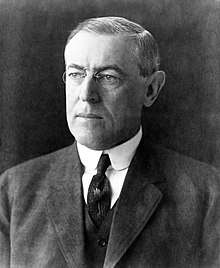 |
Woodrow Wilson | Class of 1879; member of the faculty and president emeritus of the University | Peace | 28th President of the United States; founder of the League of Nations.[4] |
| 1927 |  |
Arthur Compton (shared with Charles Thomson Rees Wilson) |
Ph.D., 1916 | Physics | "for his discovery of the effect named after him"[11] |
| 1936 | 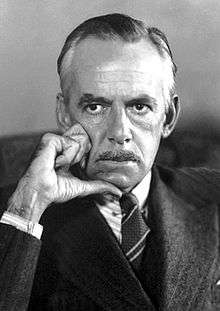 |
Eugene O'Neill | Class of 1910 | Literature | "for the power, honesty and deep-felt emotions of his dramatic works, which embody an original concept of tragedy"[12] |
| 1937 | 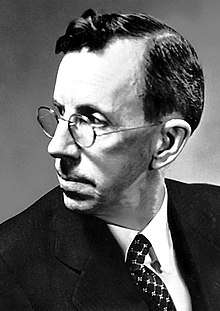 |
Clinton Davisson (shared with George Paget Thomson) |
Ph.D., 1911 | Physics | "for their experimental discovery of the diffraction of electrons by crystals"[13] |
| 1951 | 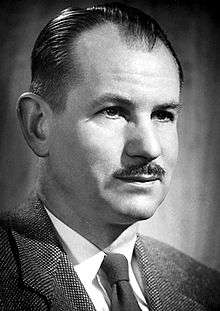 |
Edwin McMillan (shared with Glenn T. Seaborg) |
Ph.D., 1933 | Chemistry | "for their discoveries in the chemistry of transuranium elements"[14] |
| 1956 | 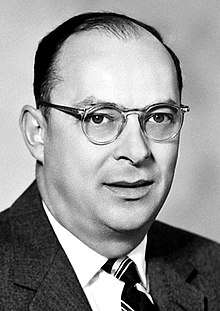 |
John Bardeen (shared with William Shockley and Walter Houser Brattain) |
Ph.D., 1936 | Physics | "for their researches on semiconductors and their discovery of the transistor effect"[15] |
| 1961 | 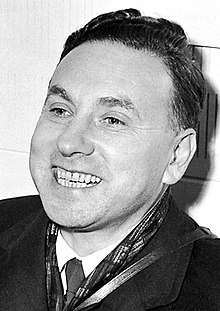 |
Robert Hofstadter (shared with Rudolf Mössbauer) |
Ph.D., 1938 | Physics | "for his pioneering studies of electron scattering in atomic nuclei and for his thereby achieved discoveries concerning the structure of the nucleons"[16] |
| 1963 | 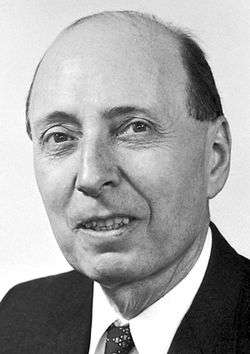 |
Eugene Wigner | Jones Professor of Mathematical Physics | Physics | "for his contributions to the theory of the atomic nucleus and the elementary particles, particularly through the discovery and application of fundamental symmetry principles"[17] |
| 1965 | 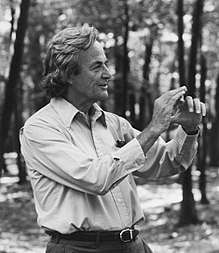 |
Richard Feynman (shared with Sin-Itiro Tomonaga and Julian Schwinger) |
Ph.D., 1942 | Physics | "for their fundamental work in quantum electrodynamics, with deep-ploughing consequences for the physics of elementary particles"[18] |
| 1972 |  |
John Bardeen (shared with Leon Cooper and John Robert Schrieffer) |
Ph.D., 1936 | Physics | "for their for their jointly developed theory of superconductivity, usually called the BCS-theory"[19] |
| 1977 | 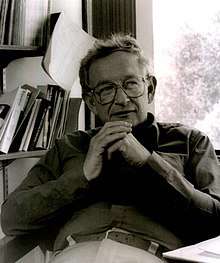 |
Philip Warren Anderson (shared with Nevill Francis Mott and John Hasbrouck Van Vleck) |
Joseph Henry Professor of Physics | Physics | "for their fundamental theoretical investigations of the electronic structure of magnetic and disordered systems"[20] |
| 1978 | 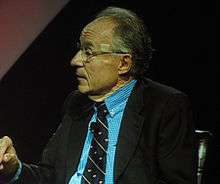 |
Arno Allan Penzias (shared with Pyotr Kapitsa and Robert Woodrow Wilson) |
Visiting lecturer with rank of professor | Physics | "for their discovery of cosmic microwave background radiation"[21] |
| 1979 | Arthur Lewis (shared with Theodore Schultz) |
James Madison Professor of Political Economy | Economics | "for their pioneering research into economic development research with particular consideration of the problems of developing countries."[22] | |
| 1979 |  |
Steven Weinberg (shared with Sheldon Lee Glashow and Abdus Salam) |
Ph.D., 1957 | Physics | "for their contributions to the theory of the unified weak and electromagnetic interaction between elementary particles, including, inter alia, the prediction of the weak neutral current"[23] |
| 1980 |  |
James Cronin (shared with Val Logsdon Fitch) |
Professor of physics | Physics | "for the discovery of violations of fundamental symmetry principles in the decay of neutral K-mesons"[5] |
| 1980 |  |
Val Logsdon Fitch (shared with James Cronin) |
Fogg Brackett Professor of Physics | Physics | "for the discovery of violations of fundamental symmetry principles in the decay of neutral K-mesons"[5] |
| 1992 | 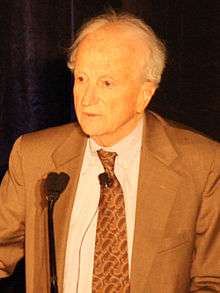 |
Gary Becker | Class of 1951 | Economics | "for having extended the domain of microeconomic analysis to a wide range of human behaviour and interaction, including non-market behaviour."[24] |
| 1993 | 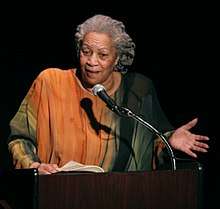 |
Toni Morrison | Robert F. Goheen Professor in the Humanities | Literature | "who in novels characterized by visionary force and poetic import, gives life to an essential aspect of American reality"[25] |
| 1993 | 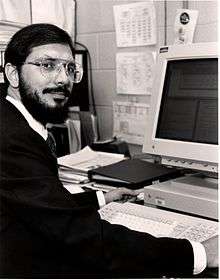 |
Russell Alan Hulse (shared with Joseph Hooton Taylor, Jr.) |
Principal research physicist, Princeton Plasma Physics Laboratory | Physics | "for the discovery of a new type of pulsar, a discovery that has opened up new possibilities for the study of gravitation"[6] |
| 1993 |  |
Joseph Hooton Taylor, Jr. (shared with Russell Alan Hulse) |
James S. McDonnell Distinguished University Professor of Physics | Physics | "for the discovery of a new type of pulsar, a discovery that has opened up new possibilities for the study of gravitation"[6] |
| 1994 | 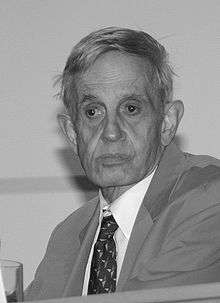 |
John Forbes Nash (shared with John Harsanyi and Reinhard Selten) |
Ph.D., 1950, senior research mathematician | Economics | "for their pioneering analysis of equilibria in the theory of non-cooperative games."[26] |
| 1995 | 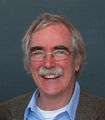 |
Eric F. Wieschaus (shared with Edward B. Lewis and Christiane Nüsslein-Volhard) |
Squibb Professor in Molecular Biology | Physiology or Medicine | "for their discoveries concerning the genetic control of early embryonic development"[27] |
| 1996 | 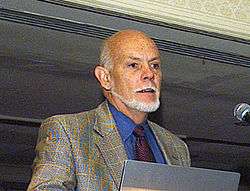 |
Richard Smalley (shared with Robert Curl and Harold Kroto) |
Ph.D., 1974 | Chemistry | "for their discovery of fullerenes"[28] |
| 1998 |  |
Daniel Chee Tsui (shared with Robert B. Laughlin and Horst Ludwig Störmer) |
Arthur Legrand Doty Professor of Electrical Engineering | Physics | "for their discovery of a new form of quantum fluid with fractionally charged excitations"[29] |
| 2000 | 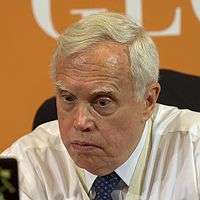 |
James Heckman (shared with Daniel McFadden) |
M.A., 1968, Ph.D., 1971 | Economics | "for his development of theory and methods for analyzing selective samples."[30] |
| 2001 | 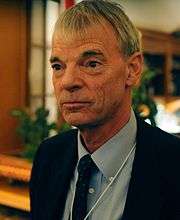 |
Michael Spence (shared with George Akerlof and Joseph Stiglitz) |
Class of 1966 | Economics | "for their analyses of markets with asymmetric information."[31] |
| 2002 |  |
Daniel Kahneman (shared with Vernon L. Smith) |
Eugene Higgins Professor of Psychology and professor of public affairs | Economics | "for having integrated insights from psychological research into economic science, especially concerning human judgment and decision-making under uncertainty."[32] |
| 2004 | David Gross (shared with H. David Politzer and Frank Wilczek) |
Thomas Jones Professor of Mathematical Physics Emeritus | Physics | "for the discovery of asymptotic freedom in the theory of the strong interaction"[7] | |
| 2004 |  |
Frank Wilczek (shared with David Gross and H. David Politzer) |
Ph.D., 1975 | Physics | "for the discovery of asymptotic freedom in the theory of the strong interaction"[7] |
| 2007 |  |
Eric Maskin (shared with Leonid Hurwicz and Roger Myerson) |
Visiting lecturer with the rank of professor of economics | Economics | "for having laid the foundations of mechanism design theory."[33] |
| 2008 | 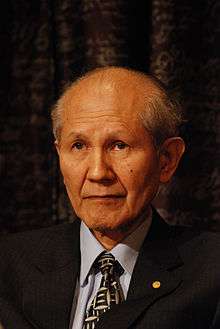 |
Osamu Shimomura (shared with Martin Chalfie and Roger Tsien) |
Research associate in biology | Chemistry | "for the discovery and development of the green fluorescent protein, GFP"[34] |
| 2008 |  |
Paul Krugman | Professor of economics and international affairs | Economics | "for his analysis of trade patterns and location of economic activity."[35] |
| 2010 | .jpg) |
Mario Vargas Llosa | Visiting professor of Latin American Studies | Literature | "for his cartography of structures of power and his trenchant images of the individual's resistance, revolt, and defeat"[36] |
| 2011 | 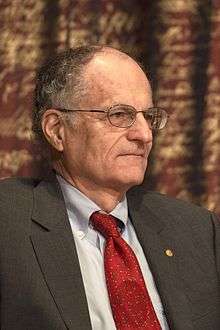 |
Thomas Sargent (shared with Christopher Sims) |
Visiting professor of economics | Economics | "for their empirical research on cause and effect in the macroeconomy"[8] |
| 2011 | 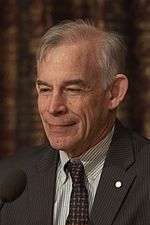 |
Christopher Sims (shared with Thomas Sargent) |
Harold B. Helms Professor of Economics | Economics | "for their empirical research on cause and effect in the macroeconomy"[8] |
| 2012 | 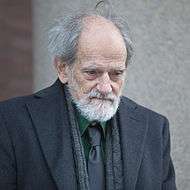 |
Lloyd Shapley (shared with Alvin E. Roth) |
Ph.D., 1953 | Economics | "for the theory of stable allocations and the practice of market design"[37] |
| 2013 | James Rothman (shared with Randy Schekman and Thomas C. Südhof) |
Squibb Professor in Molecular Biology | Physiology or Medicine | "for their discoveries of machinery regulating vesicle traffic, a major transport system in our cells"[38] | |
| 2015 |  |
Tomas Lindahl (shared with Paul L. Modrich and Aziz Sancar) |
Postdoctoral researcher | Chemistry | "for mechanistic studies of DNA repair"[39] |
| 2015 |  |
Angus Deaton | Dwight D. Eisenhower Professor of Economics and International Affairs | Economics | "for his analysis of consumption, poverty, and welfare"[40] |
| 2015 | 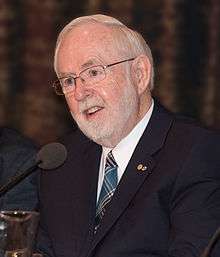 |
Arthur B. McDonald (shared with Takaaki Kajita) |
Professor of physics | Physics | "for the discovery of neutrino oscillations, which shows that neutrinos have mass"[41] |
| 2016 | .jpg) |
Oliver Hart (shared with Bengt R. Holmström) |
Ph.D., 1974 | Economics | "for their contributions to contract theory"[42] |
| 2016 | 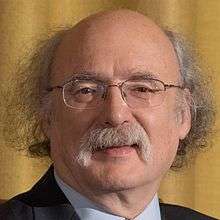 |
Duncan Haldane (shared with David Thouless and J. Michael Kosterlitz) |
Eugene Higgins Professor of Physics | Physics | "for theoretical discoveries of topological phase transitions and topological phases of matter"[43] |
| 2017 | 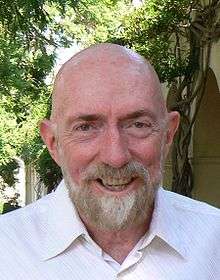 |
Kip Thorne (shared with Rainer Weiss and Barry C. Barish) |
Ph.D., 1965 | Physics | "for decisive contributions to the LIGO detector and the observation of gravitational waves"[44] |
| 2018 | 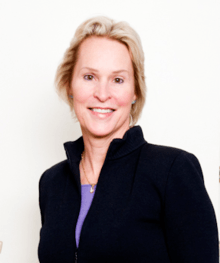 |
Frances Arnold (shared with George P. Smith and Gregory P. Winter) |
Class of 1979 | Chemistry | "for the directed evolution of enzymes"[45] |
See also
References
- ↑ "Alfred Nobel – The Man Behind the Nobel Prize". Nobel Foundation. Retrieved 2008-10-18.
- ↑ "The Nobel Prize". Nobel Foundation. Retrieved 2008-10-18.
- ↑ "Honors & Awards". Princeton University. Retrieved 2018-10-03.
- 1 2 "Nobel Peace Prize 1919". Nobel Foundation. Retrieved 2008-10-18.
- 1 2 3 "The Nobel Prize in Physics 1980". Nobel Foundation. Retrieved 2008-10-18.
- 1 2 3 "Nobel Prize in Literature 1993". Nobel Foundation. Retrieved 2018-10-04.
- 1 2 3 "The Nobel Prize in Physics 2004". Nobel Foundation. Retrieved 2008-10-18.
- 1 2 3 "The Sveriges Riksbank Prize in Economic Sciences in Memory of Alfred Nobel 2011". Nobel Foundation. Retrieved 2011-11-18.
- ↑ "William Kentridge Lecture". Lewis Center for the Arts. Retrieved 2018-04-06.
- ↑ "Nadine Gordimer Biography". biography.jrank.org. Retrieved 2018-04-06.
- ↑ "Nobel Prize in Physics 1927". Nobel Foundation. Retrieved 2008-10-18.
- ↑ "Nobel Prize in Literature 1936". Nobel Foundation. Retrieved 2008-10-18.
- ↑ "The Nobel Prize in Physics 1937". Nobel Foundation. Retrieved 2008-10-18.
- ↑ "The Nobel Prize in Chemistry 1951". Nobel Foundation. Retrieved 2008-10-18.
- ↑ "The Nobel Prize in Physics 1956". Nobel Foundation. Retrieved 2008-10-18.
- ↑ "The Nobel Prize in Physics 1961". Nobel Foundation. Retrieved 2008-10-18.
- ↑ "The Nobel Prize in Physics 1963". Nobel Foundation. Retrieved 2008-10-18.
- ↑ "The Nobel Prize in Physics 1965". Nobel Foundation. Retrieved 2008-10-18.
- ↑ "The Nobel Prize in Physics 1972". Nobel Foundation. Retrieved 2008-10-18.
- ↑ "The Nobel Prize in Physics 1977". Nobel Foundation. Retrieved 2008-10-18.
- ↑ "The Nobel Prize in Physics 1978". Nobel Foundation. Retrieved 2008-10-18.
- ↑ "The Sveriges Riksbank Prize in Economic Sciences in Memory of Alfred Nobel 1979". Nobel Foundation. Retrieved 2008-10-18.
- ↑ "The Nobel Prize in Physics 1979". Nobel Foundation. Retrieved 2008-10-18.
- ↑ "The Sveriges Riksbank Prize in Economic Sciences in Memory of Alfred Nobel 1992". Nobel Foundation. Retrieved 2018-10-04.
- ↑ "Nobel Prize in Literature 1993". Nobel Foundation. Retrieved 2018-10-04.
- ↑ "The Sveriges Riksbank Prize in Economic Sciences in Memory of Alfred Nobel 1994". Nobel Foundation. Retrieved 2018-10-04.
- ↑ "Nobel Prize in Physiology or Medicine 1995". Nobel Foundation. Retrieved 2008-10-18.
- ↑ "The Nobel Prize in Chemistry 1996". Nobel Foundation. Retrieved 2018-10-04.
- ↑ "The Nobel Prize in Physics 1998". Nobel Foundation. Retrieved 2008-10-18.
- ↑ "The Sveriges Riksbank Prize in Economic Sciences in Memory of Alfred Nobel 2000". Nobel Foundation. Retrieved 2008-10-18.
- ↑ "The Sveriges Riksbank Prize in Economic Sciences in Memory of Alfred Nobel 2001". Nobel Foundation. Retrieved 2008-10-18.
- ↑ "The Sveriges Riksbank Prize in Economic Sciences in Memory of Alfred Nobel 2002". Nobel Foundation. Retrieved 2008-10-18.
- ↑ "The Sveriges Riksbank Prize in Economic Sciences in Memory of Alfred Nobel 2007". Nobel Foundation. Retrieved 2008-10-18.
- ↑ "The Nobel Prize in Chemistry 2008". Nobel Foundation. Retrieved 2008-10-18.
- ↑ "The Sveriges Riksbank Prize in Economic Sciences in Memory of Alfred Nobel 2008". Nobel Foundation. Retrieved 2008-10-14.
- ↑ "The Nobel Prize in Literature 2010". Nobel Foundation. Retrieved 2011-11-18.
- ↑ "The Sveriges Riksbank Prize in Economic Sciences in Memory of Alfred Nobel 2012". Nobel Foundation. Retrieved 2018-10-04.
- ↑ "The Nobel Prize in Physiology or Medicine 2013". Nobel Foundation. Retrieved 2011-11-18.
- ↑ "The Nobel Prize in Chemistry 2015". Nobelprize.org. Retrieved 2016-01-10.
- ↑ "The Sveriges Riksbank Prize in Economic Sciences in Memory of Alfred Nobel 2015". Nobel Foundation. Retrieved 2018-10-04.
- ↑ "The Nobel Prize in Physics 2015". Nobel Foundation. Retrieved 2018-10-04.
- ↑ "The Sveriges Riksbank Prize in Economic Sciences in Memory of Alfred Nobel 2016". Nobelprize.org. Retrieved 2018-10-04.
- ↑ "The Nobel Prize in Physics 2016". Nobelprize.org. Retrieved 2016-10-07.
- ↑ "The Nobel Prize in Physics 2017". Nobelprize.org. Retrieved 2018-10-04.
- ↑ "The Nobel Prize in Chemistry 2018". Nobelprize.org. Retrieved 2018-10-03.